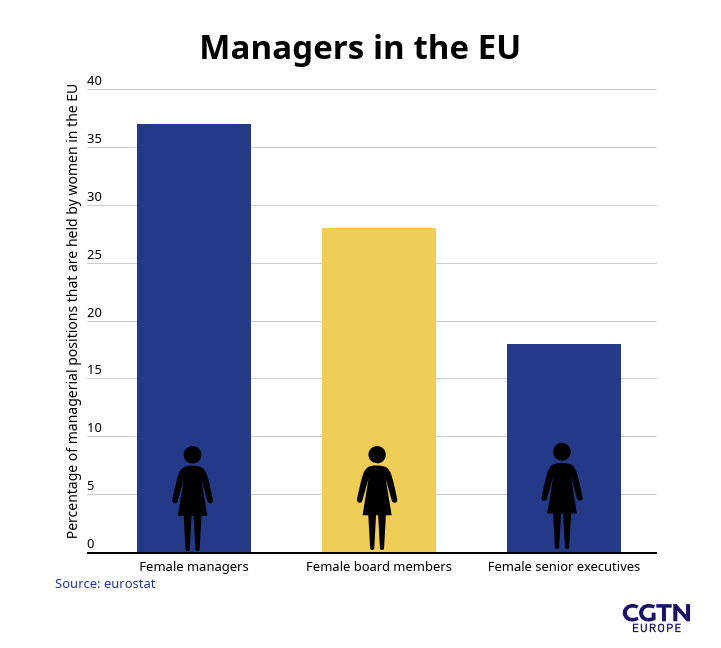
Recent statistics released by the EU's Eurostat agency reveal only one in three managers are women. /Echo/Getty Creative
In Europe, more than 6.7 million people hold managerial positions, yet only one manager out of three is a woman, despite making up half of the European workforce.
This is according to official statistics from the EU's Eurostat agency, which also revealed that woman account for just one-quarter of board members of publicly listed companies. This data have been released just in time for International Women's Day on 8 March.
The European Commission has made fighting sexism in the workplace a priority and on Thursday, the EU's executive arm revealed it would propose legislation to force companies to publicly expose their gender pay gaps.
Companies should be open to pay transparency because female employees "are not going to be proud working for a company that is not paying them as much as their male counterparts," said the bloc's equality commissioner, Helena Dalli.
She also said the Commission was looking to reimplement plans for mandatory quotas of women on company boards that have been avoided by certain member states since 2012.
Despite the fact that quotas "can be a very ugly word," they were also described as "a necessary evil ... because otherwise we will wait another 100 years for things to change by themselves."
EU vice president Vera Jourova said that some member states had "not waited for Europe to introduce quotas and are seeing the results."
Eurostat said France, which is included in this list of countries, leads the EU with company boards being 45 percent filled by women – followed by Sweden, Belgium, Germany and Italy.
"We should not give up," said Jourova.
Eurostat figures also revealed that of the 6.7 million managers in 2019, 4.3 million were men and 2.5 million were women.
Among the 27 member states, Latvia is the only country to have a higher proportion of female managers than male, those with the next highest proportions were Bulgaria, Poland and Estonia.
The countries at the lower end of the scale, with the fewest female managers, were Cyprus, Luxembourg and Denmark.
Nine in 10 of all people hold bias against women
Nearly 90 percent of the world's population – of every gender – say they hold some prejudice against women, according to a UN study, which was also published ahead of International Women's Day.
The United Nations Development Programme studied 75 countries, which represent 80 percent of the world's population, and unveiled that nine in 10 people – including women – hold such mentalities.
Such examples of the prejudiced views include: the idea that men are better politicians and business leaders than women; that attending university is of more importance for men than women; and that men should receive preferential treatment in competitive job markets.
The highest proportion of those holding at least one sexist bias was in Pakistan, where 99.81 percent of people held similar prejudices. European countries such as France and Britain received similar scores, at 56 percent and 54.6 percent respectively. Meanwhile, Andorra, Sweden and the Netherlands were the countries with the lowest proportion of the population holding those with sexist beliefs at 27.01 percent, 30.01 percent and 39.75 percent respectively.
In a statement, the UN Development Programme said the numbers provide insight into the "new clues to the invisible barriers women face in achieving equality," despite "decades of progress."
"The work that has been so effective in ensuring an end to gaps in health or education must now evolve to address something far more challenging: a deeply ingrained bias – among both men and women – against genuine equality," said UNDP administrator Achim Steiner.
The agency is calling on governments and institutions to utilize education as a social tool through which institutions can alter and thus end discriminatory beliefs and practices through education.
The report also revealed an even more chilling statistic than the inequalities in education, health and the economy – finding that 28 percent of people believe it is acceptable for a man to beat his wife.

International Women's Day 2020
There theme for this year's International Women's Day 2020 (IWD 2020) campaign is #EachforEqual.
It hopes to draw attention to the fact that equality is not just an issue for women, but it is also a business issue. It seeps into a need for greater gender equality in the boardroom, the government, media coverage, workplaces, sports coverage and also a greater level of equality in health and wealth.
The first IWD took place in 1911 and was supported and participated in by more than one million people. Today, it is a global movement that everyone can take part in and is not country, region or organization specific.
This year's focus is also inspired by notions of "collective individualism, drawing upon the idea that in order for change to happen, it needs to be a collective effort incorporated into our individual actions, conversations, behaviors and mindsets," according to IWD organizers.
The campaign runs throughout the year and aims to consistently drive for a gender-equal world. The day is not only marking a call for action for accelerating gender equality, but is also a day to celebrate the social, economic, cultural and political achievements of women.
 简体中文
简体中文



